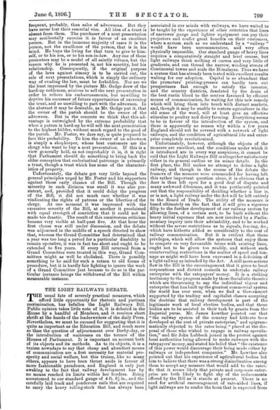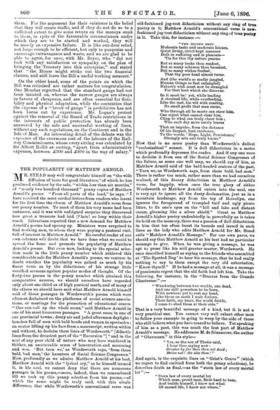THE LIGHT RAILWAYS DEBATE.
THEusual fate of severely practical measures, which afford little opportunity for rhetoric and partisan recrimination, has befallen the Light Railways Bill. Public opinion takes little note of it, it is debated in the House by a handful of Members, and it receives short shrift at the hands of the leaderwriters of the daily Press. Nevertheless, we must be excused for suggesting that it is quite as important as the Education Bill, and much more so than the question of adjournment over Derby-day, or the introduction of waitresses on the terrace of the Houses of Parliament. It is important on account both of its objects and its methods. As to its objects, it is a truism nowadays to say that cheap and abundant means of communication are a first necessity for material pro- sperity and social welfare, but this truism, like so many others, appears to have been thrust aside in favour of more fashionable paradoxes, and England is only just awaking to the fact that railway development has by no means reached its limits within her borders. Being accustomed to our standard gauge of 4 ft. 89 in., and the carefully laid track and ponderous rails that are required to carry the heavy rolling-stock that has always been associated in our minds with railways, we have waited to be taught by the experience of other countries that lines of narrower gauge and lighter equipment can pay their projectors and confer great benefits on their customers, where a system such as we understand by a "railway " would have been unremunerative, and very often physically impossible. Our standard gauge of heavy lines requires a comparatively straight and level course, but light railways think nothing of curves and very little of gradients, and can thread the narrow, winding streets of Continental towns and scale the Himalayas. Thus we have a system that has already been tested with excellent results waiting for our adoption. Capital is so abundant that the promoters' printing-presses can hardly turn out prospectuses fast enough to satisfy the investor, and the country districts, desolated by the drain of the best rustic blood to the centres favoured by efficient means of communication, lie waiting for this new remedy which will bring them into touch with distant markets, and, though it may be unable to restore agriculture in the old sense of the word, will at least give an effective stimulus to poultry and dairy farming. Everything seems to be in favour of the introduction of the system, and there is apparently no reason why within a few years England should not be covered with a network of light railways, and the condition of agricultural life and enter- prise completely revolutionised.
Unfortunately, however, although the objects of the measure are excellent, and the conditions under which it is introduced are in every way auspicious, it cannot be said that the Light Railways Bill is altogether satisfactory either in its general outline or its minor details. In the first place, the Bill makes no attempt to define a light railway, and though in the course of the debate the framers of the measure were commended for having left this rather important question alone, it is obvious that a door is thus left open for a good deal of dispute and many awkward dilemmas, and it was pertinently pointed out that the responsibility of deciding whether a line is, or is not, a light railway under the Act will be left entirely to the Board of Trade. The utility of the measure is based ultimately on the fact that it will give a vigorous fillip to the further development of our railway system by allowing lines, of a certain sort, to be built without the heavy initial expenses that are now involved by a Parlia- mentary inquiry into their advisability, and to-be worked without the severe restrictions as to signals, fencing, &c., .which have hitherto added so considerably to the cost of railway communication. But it is evident that these privileges, which will allow the systems that enjoy them to compete on very favourable terms with existing lines, ought not to be given too readily, and without such countervailing restrictions in the matter of speed and ton- nage as might well have been expressed in a definition of a light railway as intended by the Act. A still more serious flaw in the Bill is the encouragement that it gives to local corporations and district councils to undertake railway enterprise with the ratepayers' money. It is a striking testimony to the progress made by those Socialistic theories which are threatening to sap the individual vigour and enterprise that has built up the greatest commercial system the world has ever seen, when we find a Government supported by the trading and capitalist classes accepting the doctrine that railway development is part of the legitimate work of local elective bodies, and that these bodies are to be assisted in their task by grants from the Imperial purse. Mr. James Lowther pointed out that "the railway system of the country had hitherto been developed at the cost of private enterprise," and epigram- matically objected to the rates being " placed at the dis- posal of those who wished to engage in railway specula- tion," and Sir John Lubbock joined in the protest against local authorities being allowed to make railways with the ratepayers' money, and stated his belief that " the existence of this power would discourage their being made either by railways or independent companies." Mr. Lowther also pointed out that his experience of agricultural bodies led him to believe that there was a strong disinclination among them to accept any measure that would add to the rates. So that it seems likely that private and corporate enter- prise are both likely to fight shy of the inducements offered by the Bill as it stands at present. There is no need for artificial encouragement of rate-aided lines, if light railways are to confer the boon that is expected from them. Fur the argument for their existence is the belief t hat they will create traffic, and if they do not do so to a sufficient extent to give some return on the moneys sunk iu them, in spite of the favourable circumstances under which they are to be started and worked, they will be merely an expensive failure. It is like out-door relief, not large enough to be efficient, but only to pauperise and encourage extravagance and waste, and we are glad to be able to agree, fur once, with Mr. Bryce, who " did not look with any satisfaction or sympathy on the plan of bringing the Treasury into this enterprise," and stated that " the House might strike out the two financial clauses, and still leave the Bill a useful working measure."
On the other hand, some of the points on which the Bill was criticised are rather matters for congratulation. One Member regretted that the standard gauge had not been insisted on, whereas the narrow gauges are always in favour of cheapness, and are often essential for flexi- bility and physical adaptation, while the contention that the expense of a " break of gauge " is prohibitive has not been borne out by experience. Mr. Logan's protest against the removal of the Board of Trade restrictions in the interests of public protection has already been answered by the safe and successful working of lines, without any such regulations, on the Continent and in the Isle of Man. An interesting detail of the debate was the exposure of the enormous cost of the labours of the Rail- way Commissioners, whose every sitting was calculated by Sir Albert Rollit as costing, "apart from administrative expenses, between £300 and £400 in the way of salary."







































 Previous page
Previous page